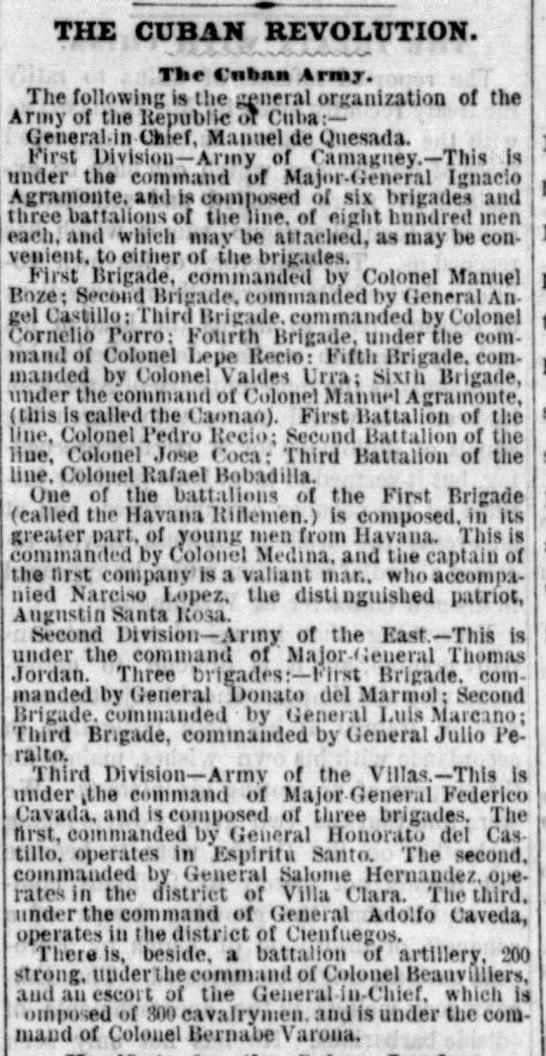"Adios, Cuba, para siempre!" - The story of a Cuban-born veteran of the Civil War
- Rich Condon

- Oct 17, 2019
- 3 min read
With the close of 2019's National Hispanic Heritage Month, we examine the career of Federico Fernandez Cavada - a Cuban-born veteran of the 114th Pennsylvania Infantry, or "Collis' Zouaves."
Though born in Cienfuegos, on Cuba's southern coast, Cavada and his family moved to Philadelphia in 1838 following the death of his father. His mother, an American citizen, was native to the "City of Brotherly Love," and settled with her three sons near the banks of the Delaware River.
At the outbreak of the American Civil War, Cavada volunteered for three-months' service with the 23rd Pennsylvania Infantry, and raised a company of his own. With the expiration of this initial term, however, Cavada went on to serve as an engineer and topographer with the hot air balloon unit of the Army of the Potomac during the Peninsular Campaign. In the fall of 1862, Cavada was commissioned Major in a newly raised regiment from the Philadelphia area - the 114th Pennsylvania Infantry, commanded by Irish-born Colonel Charles Collis. This unit of red and blue clad Zouaves would go on to be one of the most well known fighting machines of the Army of the Potomac.

While serving in the capacity of Lieutenant Colonel, Cavada commanded the regiment at the battle of Gettysburg in the absence of Colonel Collis. This engagement bore a devastating blow to the regiment, who arrived on the field on July 2 with 341 men, and left with a weakened 184. Among the casualties was Lieutenant Colonel Cavada, who had been captured during the regiment's retreat across Cemetery Ridge after engaging William Barksdale's Mississippians near the Sherfy Farm. Cavada subsequently spent the next six months in Richmond's Libby Prison, where he penned the manuscript for his 1864 publication, "Libby Life."

With Cavada's release from the notorious Rebel prison, he returned to Philadelphia to recover, as his health was in frail condition. It was here that he eventually accepted a position on General David Birney's staff, where he served until his resignation following Birney's death in October 1864. Toward the close of the war, Cavada secured a position as United States Consul at Trinidad de Cuba, after a successful meeting with Secretary of State William Seward. After his arrival at his new post, Cavada wrote home to a close friend and fellow veteran, who later published the correspondence written from abroad:



The position accepted by Cavada as United States Consul was held from January 1865 to February 1869, as he resigned to accept a Generalship in the Cuban army during their revolution, commanding the Third Division "Army of the Villas." He would eventually rise to direct all Cuban forces by April 1870. While on campaign, he earned the nickname "Fire King," for his tendency to burn Spanish structures and property, and thus equally earned the hatred of Spanish forces.

Unfortunately for Cavada and the Cuban cause, he would be captured in June 1871. The New York Herald reported on July 4:
"The Spanish gunboat Neptuno captured the insurgent General Fredrico Cavada, while he was trying to leave the island. He was taken to Puerto Principe for trial. His execution is certain... Three more insurgent leaders on Cayo-Cruz, where Cavada was captured, were surrounded by Spanish seamen and troops and killed."
Following the revolutionary's arrest, many requests were made to spare his life. Letters written by former commanders George Gordon Meade, Daniel Sickles, and Ulysses S. Grant were sent in vain to Spanish authorities. By the time news of his capture reached the United States, Cavada had already been executed by a firing squad on July 1. Federico Fernandez Cavada's final words rang loudly before he met his fate, "Adios, Cuba, para siempre!" (Good-bye Cuba, forever.)





Comments